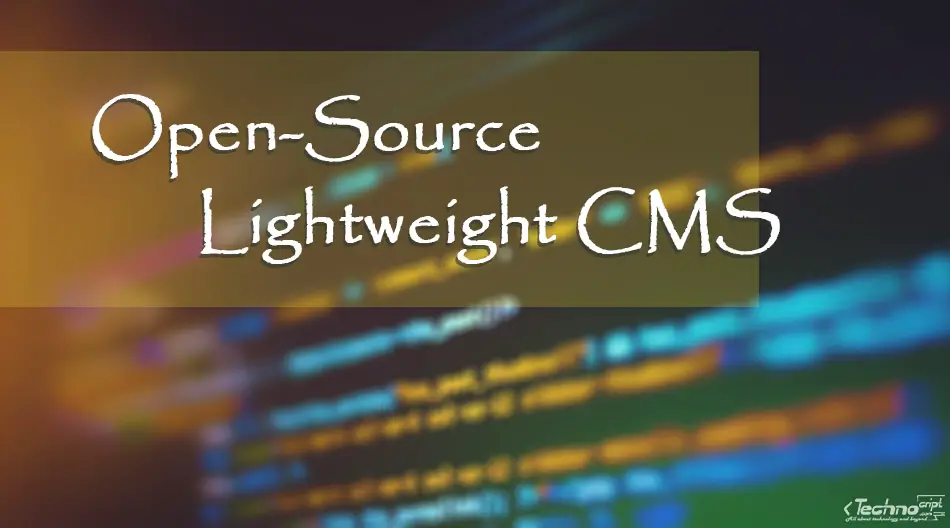The aim of lightweight CMS tools is to facilitate content management using simple and easy-to-use techniques. Just like any other software, some lightweight cms platforms impose restrictions on using the cms, modifying its source code, or reusing it in another context.
A lightweight open-source CMS is often released under an open-source license. Which allows users to use and change the software for free and for any purpose. The aim of open-source cms is to grant permissions to access, use, re-use, and redistribute the software with few or no restrictions.
In this article, we list and compare the most popular lightweight and open-source content management systems.
Here is a detailed comparison between considered CMS platforms. For more details about each system click on its name.
| CMS | Programming Language | Database | License | GitHub Stars* | Size* |
|---|---|---|---|---|---|
| Jekyll CMS | Ruby | No Database | MIT | 45K | 3 MB |
| Grav CMS | PHP | No Database | MIT | 13K | 22 MB |
| PageKit CMS | PHP | MySQL | SQLite | MIT | 5.5K | 5 MB |
| Pico CMS | PHP | No Database | MIT | 3.6K | 300 KB |
| Anchor CMS | PHP | MySQL | GNU-GPL | 3.3K | 1 MB |
| Bolt CMS | PHP | SQLite | MySQL | MariaDB | MIT | 4.1K | 17 MB |
| Fork CMS | PHP | MySQL | MIT | 1.1K | 62 MB |
| Textpattern CMS | PHP | MySQL | GNU-GPL | 700 | 8 MB |
| WonderCMS | PHP | No Database | MIT | 500 | 150 KB |
| CouchCMS | PHP | MySQL | CPAL | 300 | 7 MB |
| Automad CMS | PHP | No Database | MIT | 350 | 4 MB |
| Batflat CMS | PHP | No Database | Freeware | 120 | 3 MB |
| CMS Made Simple | PHP | MySQL | GNU-GPL | N/A | 7 MB |
* Approximate numbers at the time of writing this article.
1. Jekyll CMS
Jekyll is a simple, blog-aware, and lightweight open-source cms in the form of a static site generator. It’s designed to create personal projects or organization sites. It’s basically a static site generator that helps create static site files, which can be hosted as HTML files on any website.
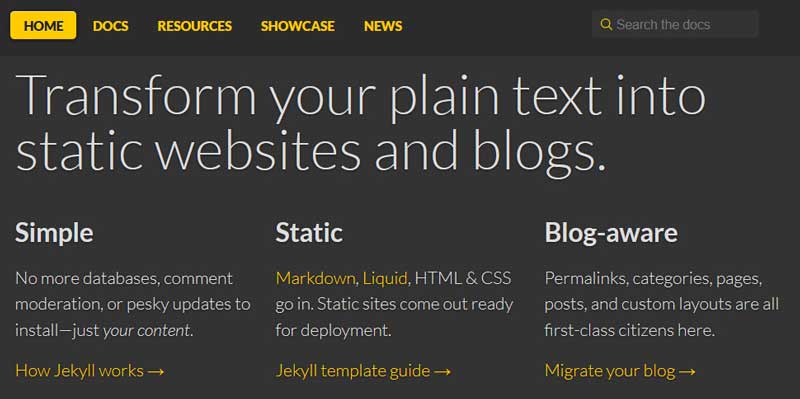
Jekyll CMS Highlights:
- Blog-aware static site generator.
- No need for databases and CMS framework.
- No server maintenance and regular updates are needed.
- Sites tend to be extremely fast and can be hosted for free on GitHub Pages.
- Supports loading content from YAML, JSON, CSV, and TSV files.
- Few themes and plugins are available.
- Has a relatively small community.
Jekyll CMS Specs:
| Logo | 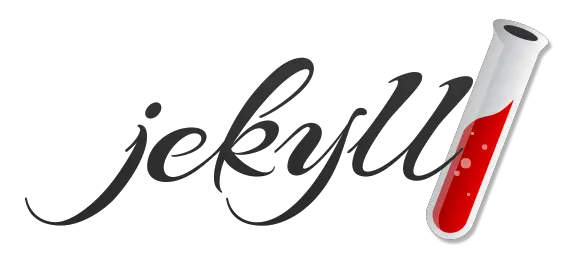 |
| Programming Language | Ruby |
| Database | Static Site Generator (Does not use databases) |
| License | MIT License |
| Type | Blogging CMS Platform (Weblogging) |
| First release | November 2008 |
| Website | https://jekyllrb.com |
| GitHub Repository | https://github.com/jekyll/jekyll |
| GitHub Repository Stars | ~ 45K |
| Size (Core System) | ~ 3 MB |
| Showcases | https://jekyllrb.com/showcase/ |
2. Grav CMS
Grav (shortened version of the word “gravity”) is a flat-file lightweight and open-source content management system. It’s designed to be easy to set up and learn. It focuses on speed and simplicity rather than providing complex built-in features.
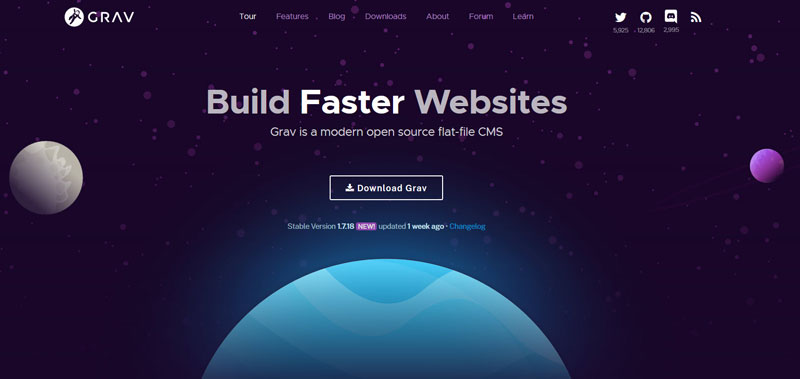
Grav CMS Highlights:
- Free, open-source, and easy to install and maintain (no database CMS).
- Uses text or markdown files to store the content.
- Difficult to build complex websites.
- Markdown dependent (users need to learn Markdown).
- Voted “Best Open Source CMS” in 2016.
- Voted “Best Flat File CMS” in 2017, 2019 & 2020.
- Grav Administration Panel plugin: provides an interface to monitor and configure the content creation process.
- Grav Premium: provides access to premium plugins, themes, and skeletons.
Grav CMS Specs:
| Logo | 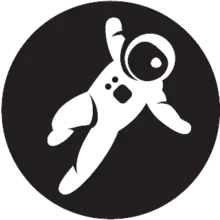 |
| Programming Language | PHP | Symfony |
| Database | Flat File (No Database CMS) |
| License | MIT License |
| Type | Web Content Management System Platform (WCMS) |
| First release | July 2014 |
| Website | https://getgrav.org |
| GitHub Repository | https://github.com/getgrav/grav |
| GitHub Repository Stars | ~ 13K |
| Size (Core System) | Grav Core (~ 22 MB) Grav Core + Admin Plugin (~ 40 MB) |
| Showcases | https://getgrav.org/#built |
3. PageKit CMS
Pagekit CMS is a modern modular and lightweight CMS. It’s an open-source content management system built with PHP and modern technologies like Symfony Components and Vue.js.
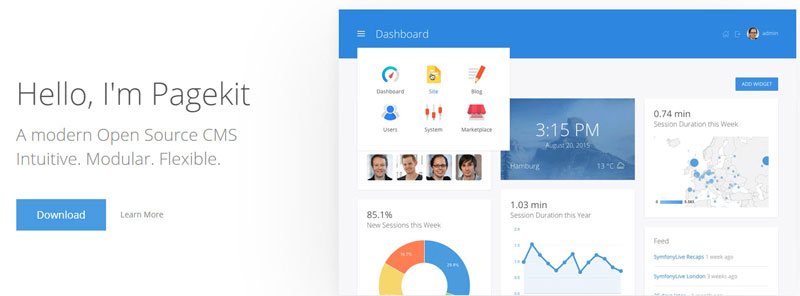
PageKit CMS Highlights:
- New and modern CMS.
- Modular architecture built on top of Symfony Components and modern open-source libraries.
- Basic features: Responsive Design, Blog, Users & Permissions, Dashboard, Media Manager, Markdown Editor, Menus & Routing, Widgets, Built-in Marketplace.
PageKit CMS Specs:
| Logo |  |
| Programming Language | PHP | Symfony Components | Vue.js |
| Database | MySQL | SQLite |
| License | MIT License |
| Type | Web Content Management System Platform (WCMS) |
| First release | September 2015 |
| Website | https://pagekit.com |
| GitHub Repository | https://github.com/pagekit/pagekit |
| GitHub Repository Stars | ~ 5.5K |
| Size (Core System) | ~ 5 MB |
| Showcases | N/A |
4. Pico CMS
Pico CMS is a simple lightweight open-source and flat-file content management system with no administration backend and database to deal with. It’s a PHP-based content management system that converts .txt files into pages.
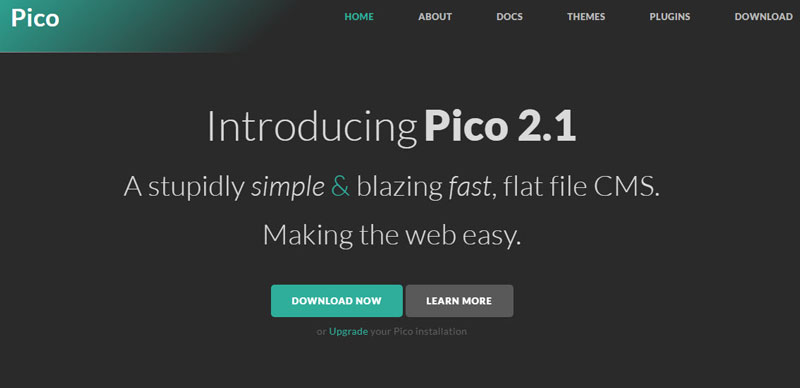
Pico CMS Highlights:
- Stupidly simple, blazing fast, flat file CMS.
- Uses Markdown for formatting pages.
- Controls metadata with YAML.
Pico CMS Specs:
| Logo | 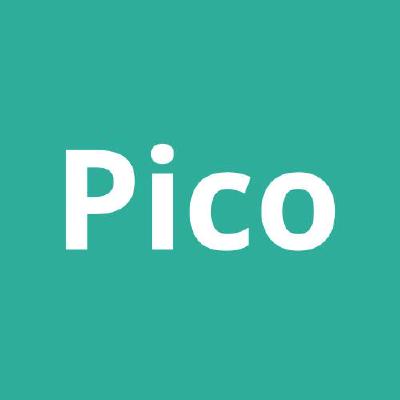 |
| Programming Language | PHP |
| Database | Flat File (No Database CMS) |
| License | MIT License |
| Type | Web Content Management System Platform (WCMS) |
| First release | April 2013 |
| Website | https://picocms.org |
| GitHub Repository | https://github.com/picocms/Pico |
| GitHub Repository Stars | ~ 3.6K |
| Size (Core System) | ~ 300 KB |
| Showcases | N/A |
5. Anchor CMS
Anchor CMS is a free and lightweight open-source blogging management system with light features. It’s written in PHP and focuses on writing blogs. It has a very simple and uncluttered admin interface that shows essential features, such as creating posts and pages and managing comments and categories.
This cms is no longer under development, we don’t recommend using it for real projects.
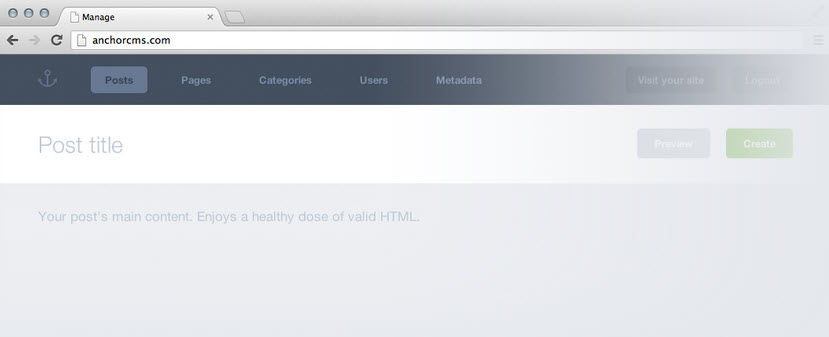
Anchor CMS Highlights:
- Extremely lightweight content management system.
- Faster page load time and database query optimization.
- Has a small theme repository and does not support plug-ins.
- Anchor CMS is no longer in active development.
Anchor CMS Specs:
| Logo |  |
| Programming Language | PHP |
| Database | MySQL |
| License | GNU General Public License Version 3 (GPLv3) |
| Type | Blogging CMS Platform (Weblogging) |
| First release | September 2014 |
| Website | https://anchorcms.com |
| GitHub Repository | https://github.com/anchorcms/anchor-cms (archived / read-only) |
| GitHub Repository Stars | ~ 3.3K |
| Size (Core System) | ~ 1 MB |
| Showcases | N/A |
6. Bolt CMS
Bolt CMS is a lightweight and open-source content management system. It’s a sophisticated and simple tool for content management. It’s a flexible tool that aims to be as simple and straightforward as possible.
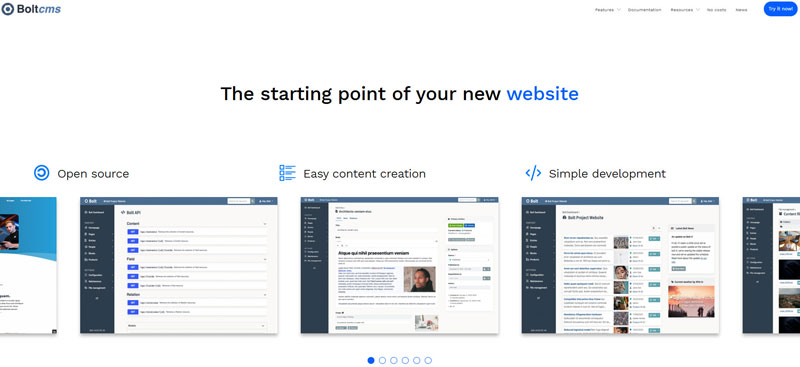
Bolt CMS Highlights:
- Free, open-source, and easy to set up and use.
- Powerful content types.
- Limited community size.
Bolt CMS Specs:
| Logo | |
| Programming Language | PHP |
| Database | SQLite | MySQL | MariaDB |
| License | MIT License |
| Type | Web Content Management System Platform (WCMS) |
| First release | November 2012 |
| Website | https://boltcms.io |
| GitHub Repository | Bolt 3: https://github.com/bolt/bolt Bolt 4: https://github.com/bolt/core |
| GitHub Repository Stars | ~ 4.1K (Bolt 3) |
| Size (Core System) | ~ 17 MB |
| Showcases | https://boltcms.io/showcases |
7. Fork CMS
Fork CMS is a free and open-source cms that uses Symfony Components. It combines user-friendly interfaces to create, manage and monitor websites for beginners and professionals.
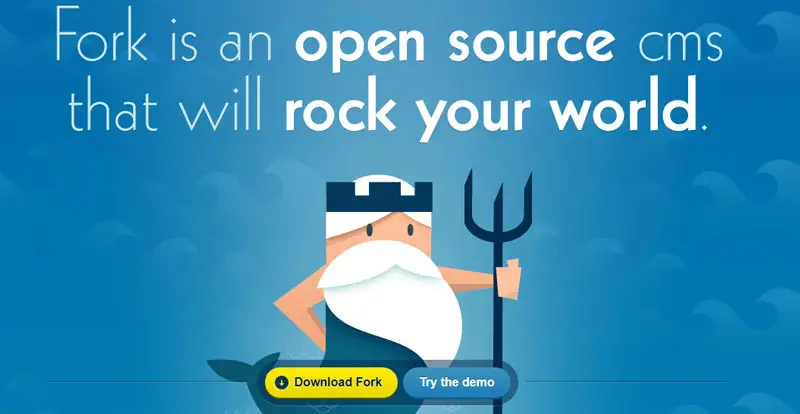
Fork CMS Highlights:
- Clear and user-friendly interfaces.
- Large collection of themes and templates.
- Ability to add apps and widgets.
- Marketing tools to optimize the website.
- SEO tools to plan an SEO strategy.
Fork CMS Specs:
| Logo |  |
| Programming Language | PHP | Symfony Components |
| Database | MySQL |
| License | MIT License |
| Type | Web Content Management System Platform (WCMS) |
| First release | October 2010 |
| Website | https://www.fork-cms.com |
| GitHub Repository | https://github.com/forkcms/forkcms |
| GitHub Repository Stars | ~ 1.1K |
| Size (Core System) | ~ 62 MB |
| Showcases | https://www.fork-cms.com/showcase |
8. Textpattern CMS
Textpattern CMS is a lightweight, flexible, fast, and easy-to-use content management system. Although it’s an open-source CMS often seen as a weblogging tool, it aims to be a general-purpose content management system and is suitable for deployment in many contexts.
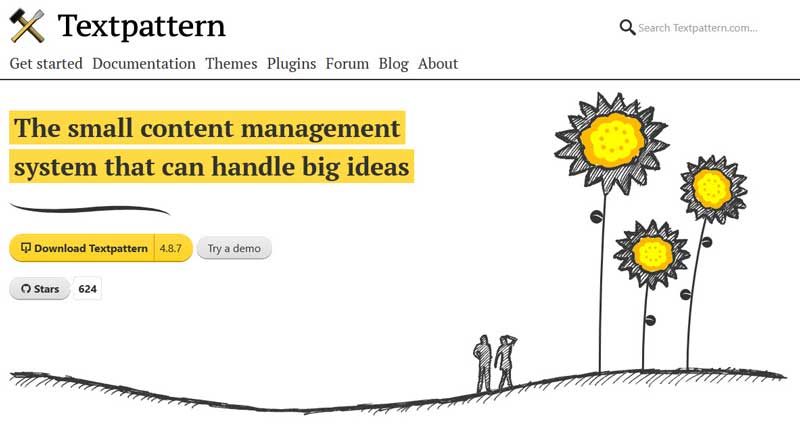
Textpattern CMS Highlights:
- Free and open-source solution.
- Often seen as a weblogging tool, but used as a general-purpose cms.
- Extensive documentation.
- Intuitive design and easy-to-use interface.
- No concept of portable design themes (each site is created uniquely and the theme can’t be changed).
- Few themes or templates.
Textpattern CMS Specs:
| Logo |  |
| Programming Language | PHP |
| Database | MySQL |
| License | GNU General Public License Version 2 (GPLv2) |
| Type | Web Content Management System Platform (WCMS) |
| First release | March 2003 |
| Website | https://textpattern.com |
| GitHub Repository | https://github.com/textpattern/textpattern/ |
| GitHub Repository Stars | ~ 700 |
| Size (Core System) | ~ 8 MB |
| Showcases | https://textpattern.com/showcase/ |
9. WonderCMS
WonderCMS is a small flat-file and open-source CMS with fast and easy editing capabilities. It uses a text file as a database and is installed without any configurations since no relational database is required.
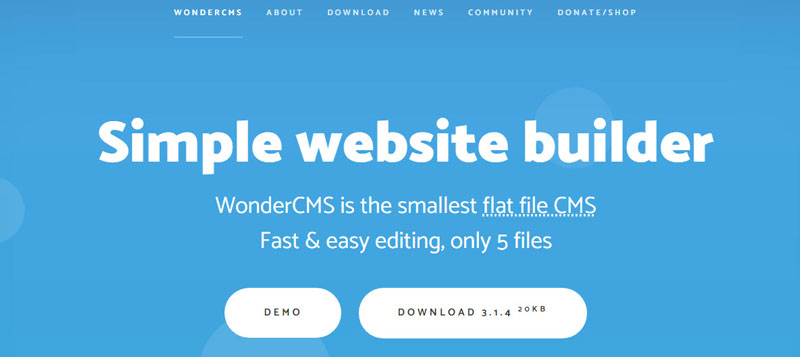
WonderCMS Highlights:
- Simple and minimalistic user experience.
- Easy installation: unzip and upload files on the server.
- Uses text files to store content.
- No dependencies or external JavaScript/CSS libraries.
WonderCMS Specs:
| Logo | 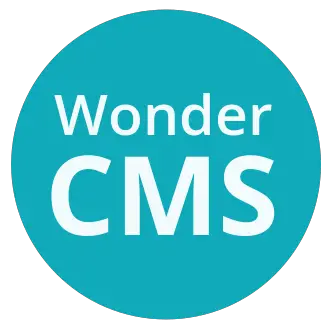 |
| Programming Language | PHP |
| Database | Flat File (No Database CMS) |
| License | MIT License |
| Type | Web Content Management System Platform (WCMS) |
| First release | December 2016 |
| Website | https://www.wondercms.com |
| GitHub Repository | https://github.com/robiso/wondercms |
| GitHub Repository Stars | ~ 500 |
| Size (Core System) | ~ 150 KB |
| Showcases | N/A |
10. CouchCMS
CouchCMS is a free and lightweight open-source content management system to design websites without coding knowledge.
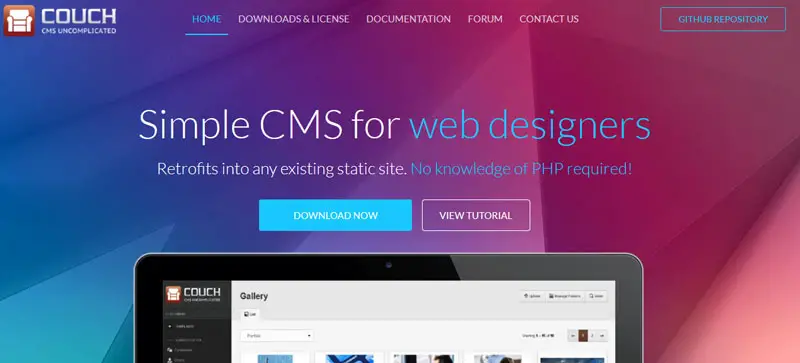
CouchCMS Highlights:
- Free and open-source.
- No coding knowledge is required.
- Powerful features like saving form submissions into the database and custom routes.
- Uses a database, so the installation requires some configurations.
- CouchCMS might be used under a commercial license.
CouchCMS Specs:
| Logo |  |
| Programming Language | PHP |
| Database | MySQL |
| License | Common Public Attribution License Version 1.0 (CPAL-1.0) |
| Type | Web Content Management System Platform (WCMS) |
| First release | February 2015 |
| Website | https://www.couchcms.com |
| GitHub Repository | https://github.com/CouchCMS/CouchCMS |
| GitHub Repository Stars | ~ 300 |
| Size (Core System) | ~ 7 MB |
| Showcases | https://www.couchcms.com/forum/viewforum.php?f=7 |
11. Automad CMS
Automad CMS is a flat-file open-source content management system and template engine. It’s fast and lightweight cms that stores content in a human-readable form. The file structure of the page’s directory reflects the website data structure.
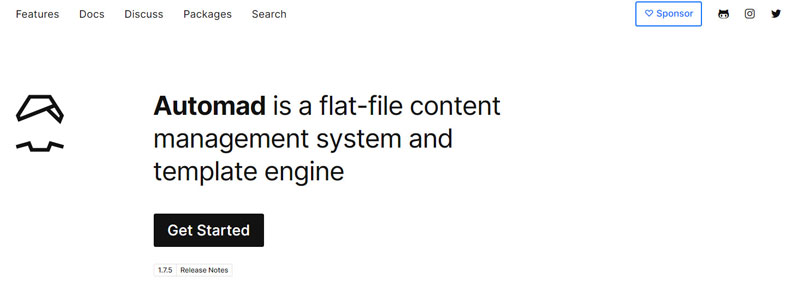
Automad CMS Highlights:
- No database is required: content is stored in human-readable text files.
- Searching and tagging are directly implemented in the core.
- Advanced multi-layer caching engine.
- Makes content accessible via a read-only JSON API.
Automad CMS Specs:
| Logo |  |
| Programming Language | PHP |
| Database | Flat File (No Database CMS) |
| License | MIT License |
| Type | Web Content Management System Platform (WCMS) |
| First release | October 2013 |
| Website | https://automad.org |
| GitHub Repository | https://github.com/marcantondahmen/automad |
| GitHub Repository Stars | ~ 350 |
| Size (Core System) | ~ 4 MB |
| Showcases | N/A |
12. Batflat CMS
Batflat CMS is a bootstrap-ready lightweight CMS that uses flat files for saving data. It’s created as a lightweight alternative to heavy and complex CMS systems.
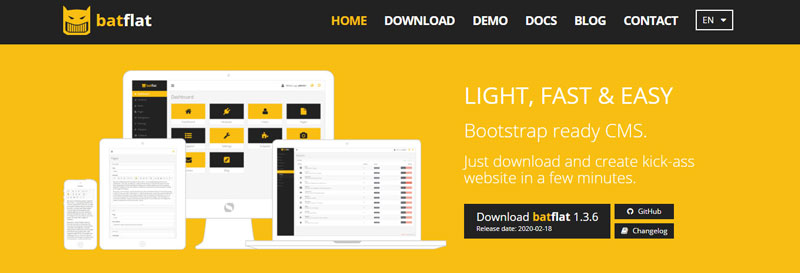
Batflat CMS Highlights:
- Light, fast, and easy bootstrap-ready CMS.
- Modular cms: you can download or create your own extensions.
- Creating and modifying a theme is simple.
- Mobile-ready and SEO-friendly.
Batflat CMS Specs:
| Logo |  |
| Programming Language | PHP |
| Database | Flat File (No Database CMS) |
| License | Freeware License |
| Type | Web Content Management System Platform (WCMS) |
| First release | May 2016 |
| Website | https://batflat.org |
| GitHub Repository | https://github.com/sruupl/batflat |
| GitHub Repository Stars | ~ 120 |
| Size (Core System) | ~ 3 MB |
| Showcases | N/A |
13. CMS Made Simple
CMS Made Simple is a free and lightweight open-source content management system. It provides web-based development and administration tools for developers, programmers, and site owners. It is suited for building and managing websites for small and medium businesses.
CMS Made Simple has no GitHub repository.
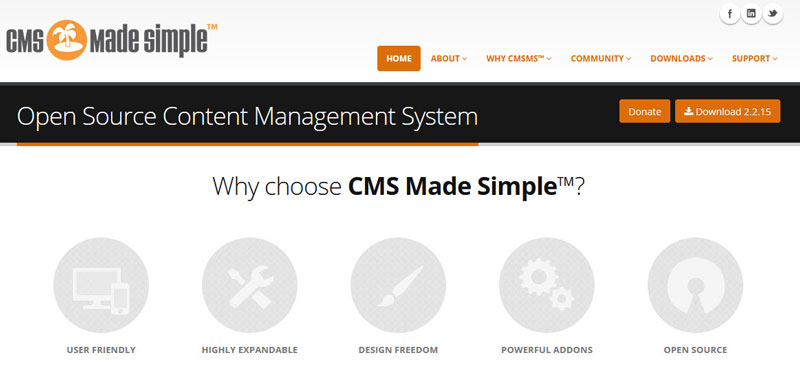
CMS Made Simple Highlights:
- Good documentation and a decent number of themes, modules, and plugins.
- API documentation and database abstraction.
- Requires intermediate development skills such as HTML, CSS, databases, …
- Not suitable for heavy websites.
- “Best Open Source CMS” Winner in the CMS Critic 2017 Awards.
- “Peoples Choice Award” in the CMS Critic 2014 Awards.
- “Best Budget CMS – Critics Choice” Nominee in the CMS Critic 2012 Awards.
- Oct, 2009 – Three Quarters of a Million Downloads Reached
- Aug, 2010 – CMS Made Simple Reaches One Million Downloads
CMS Made Simple Specs:
| Logo | |
| Programming Language | PHP |
| Database | MySQL |
| License | GNU General Public License |
| Type | Web Content Management System Platform (WCMS) |
| First release | July 2004 |
| Website | http://www.cmsmadesimple.org |
| SVN Repository | http://svn.cmsmadesimple.org/svn/cmsmadesimple/ |
| Size (Core System) | ~ 7 MB |
| Showcases | https://welovecmsms.com |

